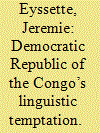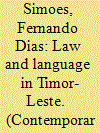| Srl | Item |
| 1 |
ID:
172348


|
|
|
|
|
| Summary/Abstract |
The aim of this article is to assess whether the Democratic Republic of the Congo (DR Congo) is likely to upgrade the status of English by constitutional or educational means. Indeed, neighboring countries such as Rwanda and Burundi adopted English as their official language in 1996 and 2014, but less writing in English is devoted to a potential linguistic transition in DR Congo, the most populous French-speaking country. This article will gauge DR Congo and Rwanda against the four criteria that arguably triggered Rwanda’s switch-to-English: historical factors in current linguistic trends; the role of charismatic leaders in sudden language policy changes; language-in-education policies; and economic incentives. The results of this interdisciplinary investigation into the language dynamics of the Great Lakes region indicate that, reflecting the vehicles of DR Congo’s domestic and regional evolutions, its leaders might be tempted to enhance the status of English as an official language in a way that, contrary to Rwanda’s radical switch-to-English, is more compatible with other languages.
|
|
|
|
|
|
|
|
|
|
|
|
|
|
|
|
| 2 |
ID:
142081


|
|
|
|
|
| Summary/Abstract |
As in other post-conflict states, the international community has been actively promoting the implementation of the rule of law in Timor-Leste. The justice system remains the weakest branch of Timor-Leste’s governance architecture. The effectiveness of the justice system is hampered by the fact that laws and proceedings are not always translated into languages understood by all court actors. Timor-Leste has a long history of multilingualism, with at least sixteen language varieties being spoken in the country. Both Tetum and Portuguese are official languages, with Portuguese being predominantly used in the courts, even though less than 10 per cent of the population is fluent in the idiom. The post-colonial legacy was one of two separate legal systems — the formal legal system and the traditional system — operating in parallel. More than a decade after independence, the former continues to have only a peripheral presence in the lives of most East Timorese. This gap between the language of the people and the language of the courts heightens the challenges to nation- and state-building in Timor-Leste. The purpose of this article is to examine the current language policy in Timor-Leste and discuss possible avenues for strengthening the formal justice system in a multilingual environment.
|
|
|
|
|
|
|
|
|
|
|
|
|
|
|
|